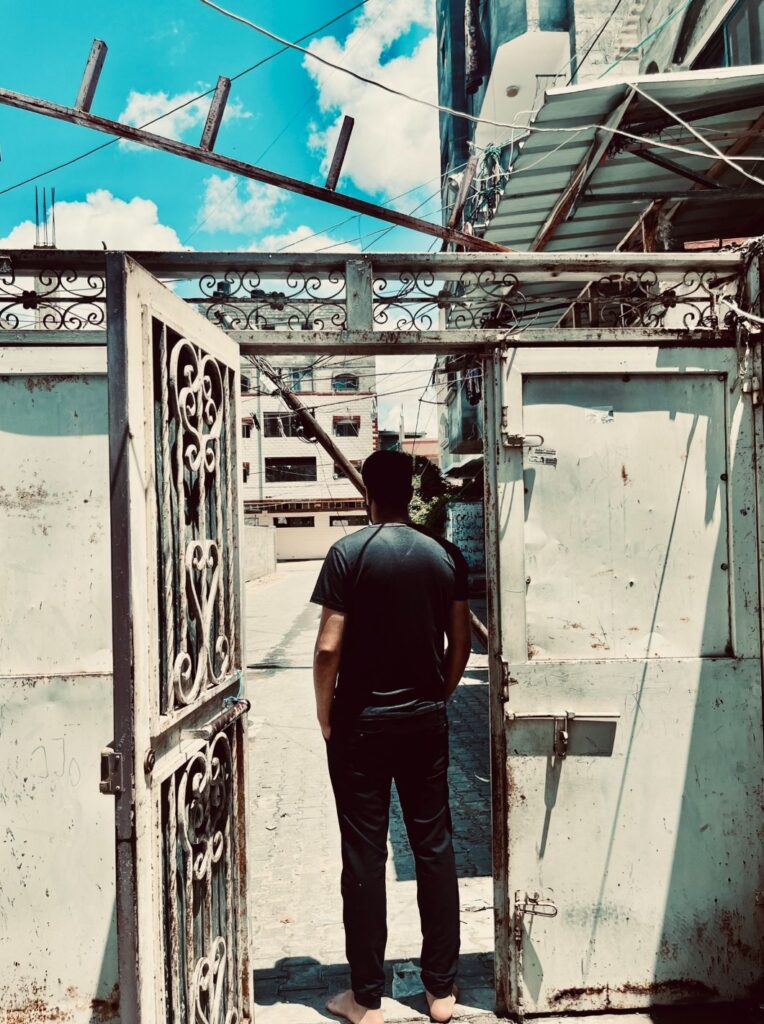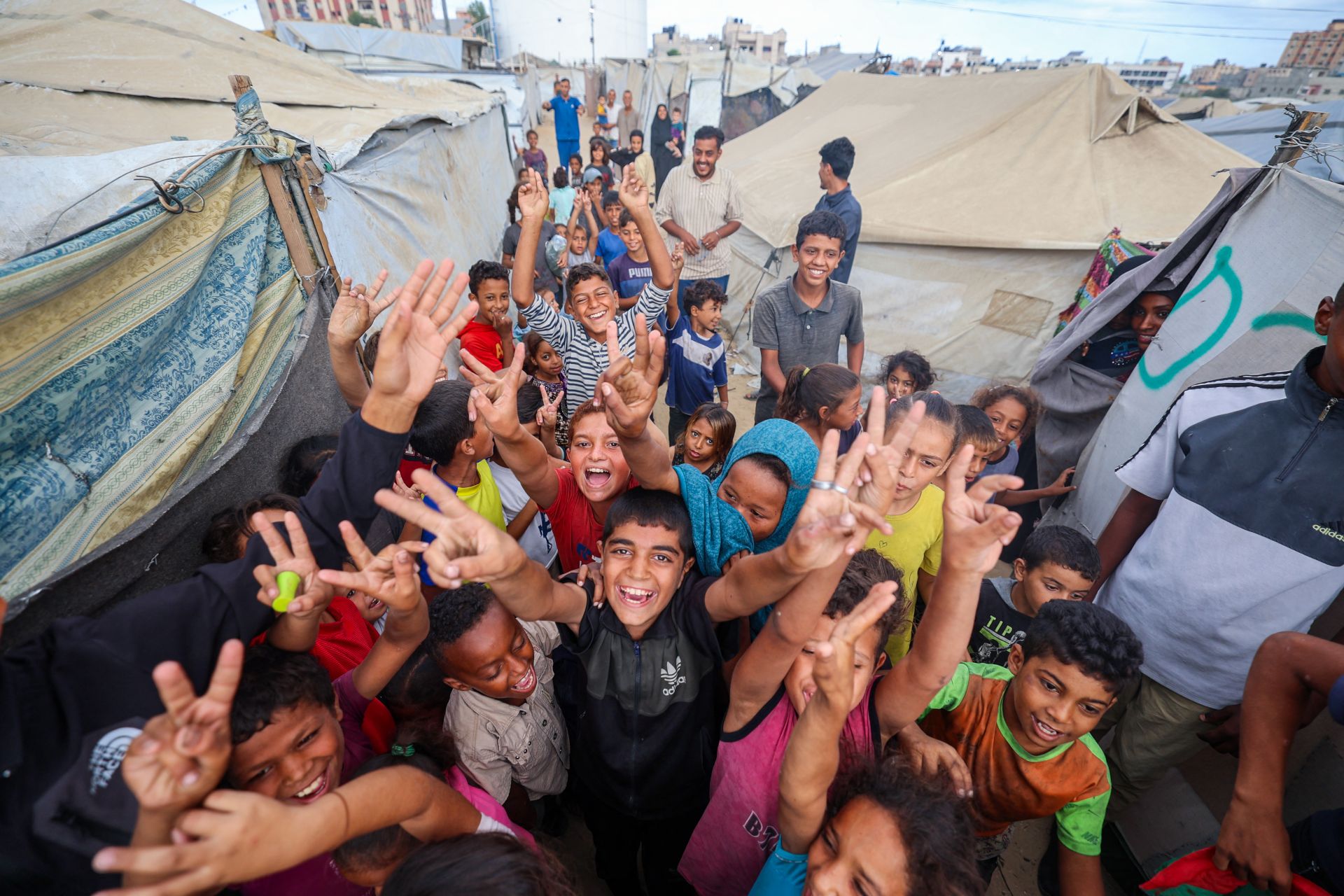It was 7 a.m. on Oct. 8, 2025. I was in our tent in al-Mawasi camp, in the south of Gaza. I woke early that morning, but this time, it was not because of my brother Mohammed running to catch the water trucks, or my friends rushing to the aid distribution points. Instead, the entire camp echoed with shouts of: “Ceasefire! Ceasefire!” After two years of genocide, our nightmare, it seemed, was finally coming to an end.
The camp felt like it had changed overnight. Some people, like me, hadn’t fully grasped the news yet, while others were singing, children were screaming in joy and some were eagerly waiting for the moment their simplest dreams could finally come true: finding food, accessing medical care, rebuilding a home, sleeping without the sound of bombs and drones.
My aunt had been glued to her phone since the first reports of the ceasefire, watching every update closely. She told me how, for her, the announcement meant the hope of seeing her husband, Abu Yusuf, again — after his arrest during the sudden tank invasion in Rafah back in mid-March. Her worry and anticipation captured the mix of relief and uncertainty that all of Gaza felt that morning.
Later that evening, I returned early to the tent to share the moment with my family. Everyone was caught between joy and disbelief — smiling, crying, uncertain whether to hope. It felt like the first deep breath after years of suffocation, a long pause from an even longer fear.

When I remember the days with my friends before 2023, I realize how deeply the war has changed not just our lives, but our dreams themselves. Since the start of the genocide, Gazans have been living in a loop of identical days, measuring time by the number of displacements, near-death experiences and people lost during these two years. Our dreams have been reduced to the simplest human wishes: rest, food, safety and belonging. The ceasefire may make it possible for people in Gaza — young and old — to dream again, but for now, we are caught between shock and hope, wondering whether the genocide has really ended.
We know, of course, that the details of a lasting peace are far from clear. Even the terms of the current ceasefire leave much of Gaza off-limits to us, with no way to rebuild the places we can access. These include our former homes and neighborhoods, our schools and the places where we made memories with our families and friends.
I recall, on Oct. 6, 2023, meeting my friends after Friday prayers. We had breakfast together, and then sat by the sea, where we stayed until sunset. I had classes the next day, including a joint presentation with a friend. I went to bed in my room and woke up at 4 a.m., went to the kitchen to make a cup of mint tea and began getting ready to catch the 7 a.m. bus that waited for me in the middle of my street.
It would be the last normal day of my life.
After two years of war, everything has changed. My friends and I are no longer the same people we were that October evening. Yet last Thursday, when the ceasefire was officially announced in Gaza, we all gathered at the beach again and shouted with joy, celebrating the news of the truce. We had mused about this day, about the first thing we would do if the bombs stopped falling.
Ramez, who is two years younger than the rest of us, had to abandon his last year of high school when the war began. He has been displaced more than any of us — over 10 times — and now lives in a small tent with his mother and sister. He dreams of traveling to see his father and younger brother. The latter was struck by an Israeli airstrike while going out to buy bread in the middle of the genocide. He lost one of his kidneys and was evacuated along with their father, who was accompanying him at the time. Beyond reuniting with his father and brother, Ramez longs to sleep on a real bed without thinking about the daily struggle for survival that has defined our lives for two years — and still continues.
Nazmi, a friend from my neighborhood, was a professional football player. He often complained to me about how hard it was to balance his university studies with his dream of becoming a famous athlete. He cared a lot about sports, and I didn’t enjoy going to restaurants with him because he ate very specific things. We all joked that he had the perfect body. When we asked him what he would do now, he paused for a moment before answering. “I just want to eat … not because food is a basic need, but because I want to eat freely, like I used to.” After six months of famine, he has no energy left. He’s lost more than 55 pounds, eating mostly out of cans. “We eat just to stay alive,” he said.
I looked at the wallpaper on Nazmi’s phone — a photo of him before the war — and I could hardly recognize him. I realized he had become a completely different person. Maybe he, too, when he looks in the mirror, no longer knows who he is. It’s a common experience for so many of us.
Ali, my cousin and friend, dreams of sleeping, too. Before the genocide, a group of us used to go out at night during university breaks to walk and sit by the sea until the early hours. We would swim, have breakfast and drink mint tea before returning home. Ali was the only one who didn’t join us on these night outings because he slept early. Even at university, he never woke up on time to catch the bus. His mother often complained about how much he slept, and when we asked him why, he simply said: “I love to sleep.” For the last two years, even if he could sleep, he never felt rested. “Anxiety has lived with me since the tent next to ours was bombed,” he told us. “I might nap a little during the day, but I fear the night.”
I met Mahmoud, my friend from Gaza City, at university. We used to have breakfast together daily at Zahran Restaurant, eating falafel, and we had a habit of visiting a new restaurant for lunch once a week. We were supposed to meet on that fateful day in October 2023 to finish a joint presentation for our novel class. After two years of war, displacement has brought us together again — on al-Mawasi Beach in Khan Younis, the very place where we used to meet as students. This time, the sea was no longer a witness to our dreams, only what remained of us. For now, Mahmoud’s dream is simple: to see all of his friends again. The war tore us apart; some we lost forever, and others were separated by distance. Before October 2023, Mahmoud was a very social person. He loved making friends and spending time with them, but the war took everything from him. In Al-Mawasi, he felt lonely; it wasn’t his place, and this wasn’t the life he wanted.
When it got late and my turn to answer never came, I walked back to my tent and asked myself the same question: “And you, Hassan — what’s the first thing you’ll do when the ceasefire is announced?”
Before the war, our dreams were different. I wanted to finish my university studies, get a scholarship abroad, and live a life full of ambition and plans. But after years of war, my dreams have become much simpler. The first thing I want to do is sleep for a long time like Ali, eat and regain my health like Nazmi, see the people I miss like Mahmoud and just sit in peace, away from the daily struggle and chaos — like Ramez.
We all have dreams that may seem simple or ordinary, but in Gaza today, we’re not asking for much. We just want peace, some rest and to be treated as humans. We want to breathe. We want to live.
“Spotlight” is a newsletter about underreported cultural trends and news from around the world, emailed to subscribers twice a week. Sign up here.



